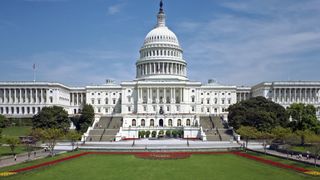Rep. Clyburn Leads Introduction of $100B Broadband Bill

House Majority Whip James Clyburn (D-S.C.) was joined by members of the House Rural Broadband Task Force and other House Democrats Wednesday (June 24) to introduce H.R. 7302, the Accessible, Affordable Internet for All Act, yet another bill to boost broadband in the time of COVID-19 and beyond.
The bill would put $100 billion into building high-speed broadband infrastructure in underserved as well as unserved communities and subsidize the service to make sure it was affordable. It would also put billions of dollars into broadband adoption programs.
Related: Birpartisan Bill Would Goose Broadband Buildouts
“Over a year ago, I formed the House Rural Broadband Task Force with the goal of bringing affordable high-speed internet to 100 percent of Americans,” said Clyburn. “Since then, the disparity between those served and unserved has become clearer. In my home state alone, nearly 1 in 10 South Carolina households lack access to a reliable broadband connection."
The bill is part of the Democrats' massive ($1.5 trillion) infrastructure bill, the Moving Forward Act.
The Clyburn bill would spend $80 billion to close the digital divide with high-speed broadband infrastructure nationwide, with $5 billion going to low interest broadband deployment loans. It would establish an office in the National Telecommunications & Information Administration (NTIA), the FCC's chief communications policy advisor, to make sure the money allocated for the program was spent efficiently.
On the affordability end, the bill would 1) require an "affordable option" for users of the built-out braodband infrastructure, 2) provide a $50 monthly subsidy for low-income residents, and 3) require the FCC to collect nationwide data on broadband pricing.
Multichannel Newsletter
The smarter way to stay on top of the multichannel video marketplace. Sign up below.
On the adoption side, it would give states $1 billion to spend on closing adoption gaps, provide $5 billion for distance learning, and funding for Wi-Fi in school buses.
The bill currently has 30 co-sponsors.
Boosting broadband funding for low-income communities runs in the family. Clyburn's daughter, Mignon, was the FCC's first African American chair and a champion for closing the digital divide.
“OTI is proud to support this bill, which would make internet service more accessible and affordable during COVID-19 and beyond," said Joshua Stager, senior counsel at New America's Open Technology Institute. "The bill would also end the FCC's regulatory war on Lifeline, remove barriers to municipal broadband networks, and make internet pricing transparent for the first time. These are all long overdue steps that would help millions of people. We applaud the Task Force for their work and urge Congress to pass this bill.”
Contributing editor John Eggerton has been an editor and/or writer on media regulation, legislation and policy for over four decades, including covering the FCC, FTC, Congress, the major media trade associations, and the federal courts. In addition to Multichannel News and Broadcasting + Cable, his work has appeared in Radio World, TV Technology, TV Fax, This Week in Consumer Electronics, Variety and the Encyclopedia Britannica.

